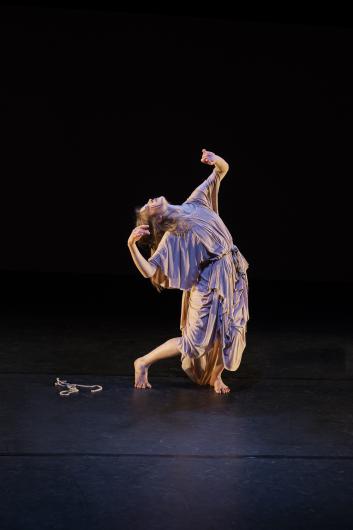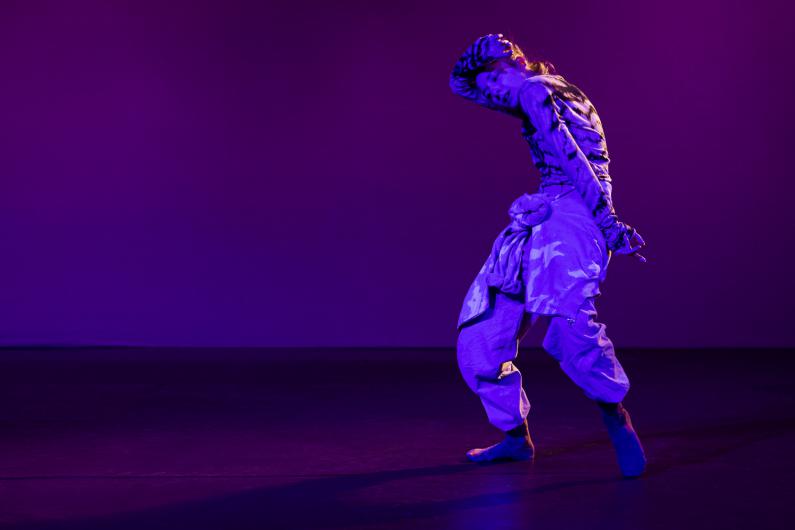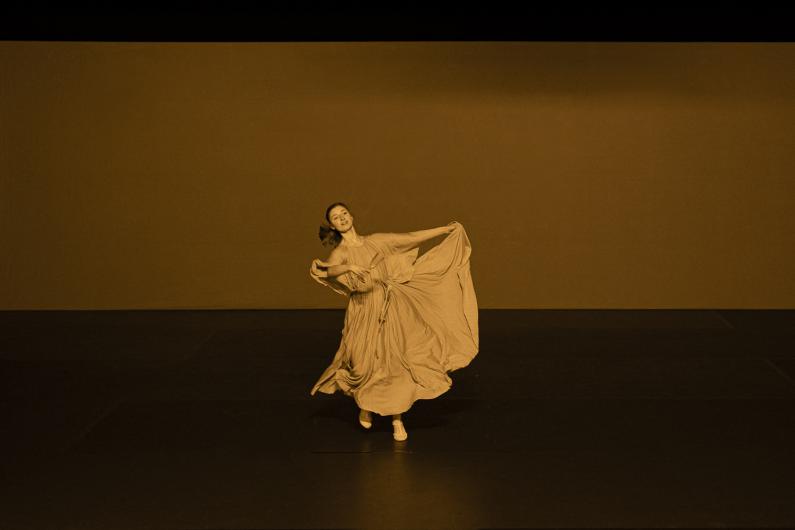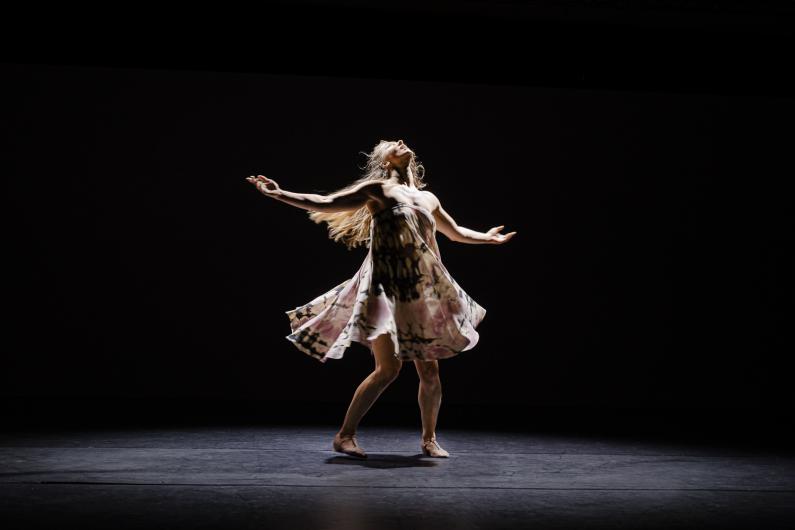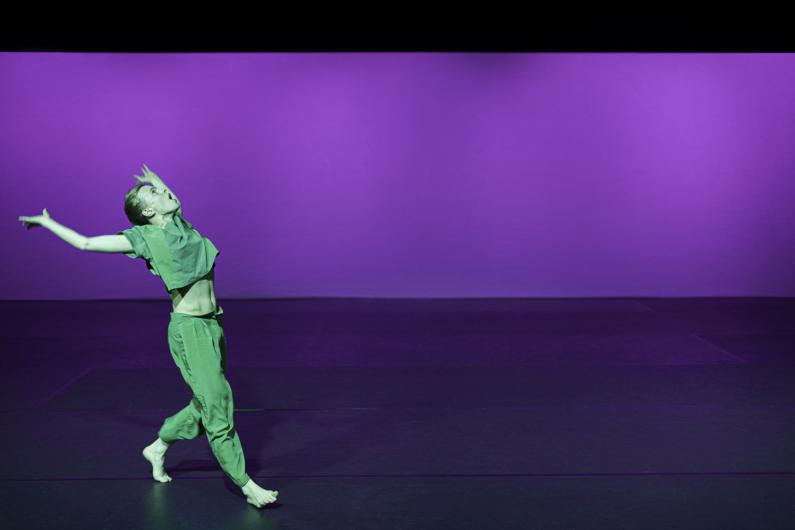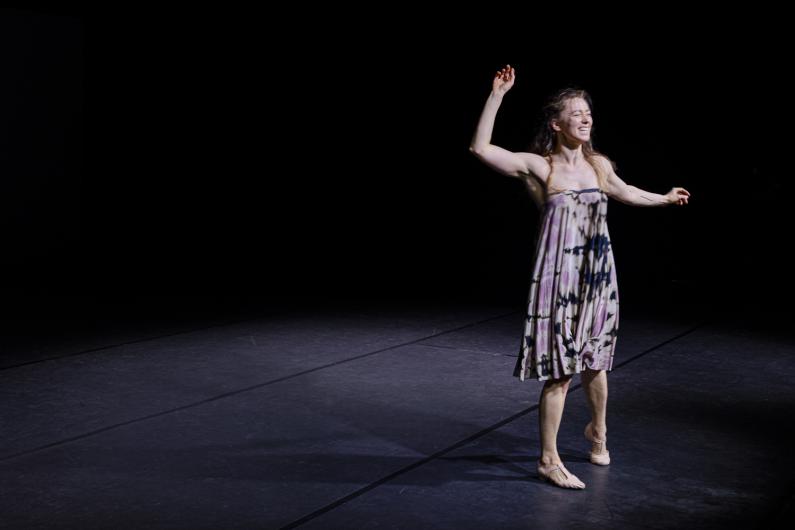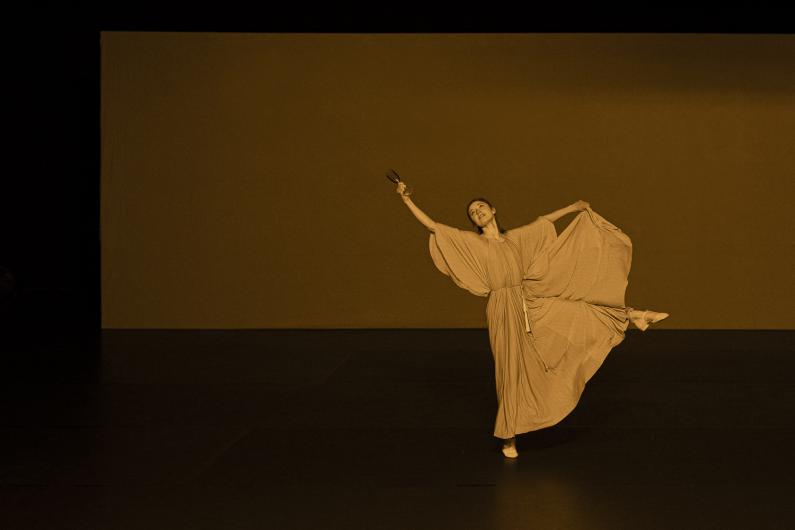Verein Lebendiges Tanzarchiv Wien
Bliss. A Thing of the Past? An appropriation
With Lea Karnutsch, Rebekka Pichler, Eva-Maria Schaller and Katharina Senk
How does it affect me, us, this pivoting and turning at a slant? Tumbling, tilting, suggesting spherical things? A woman, or not, coming from the other time, dancing into another time. What does movement do to us, exuding such dangerous cosiness? Is this bliss, so utterly un-endangered? And that’s in earnest, free of spite. We shall try anyway.
Grete Wiesenthal’s special way of dancing that stirred up the young independent scene of Vienna before World War I is the inspiration for this piece. We needed to learn it first, only to let ourselves go in it and fall into the now.
Verein Lebendiges Tanzarchiv Wien is an association that, in both theory and practice, researches the significance of dance history for the performative present. After reflections on the lives and works of the communist and Nazi opponent Hanna Berger and the formally rigid movement analyst and idealist Rosalia Chladek, both highly distinctive, they now present a piece on Grete Wiesenthal, who never tired of seeking Dionysian, ecstatic experiences. This time, artists attempt to find ‘the true core’ of Wiesenthal’s special dancing style, which has of course been hidden beneath layers of time and different ways of being relayed. They will test its current effects and search for means of continuation in a manner both critical and creative. Rather than building a museum, they will bring history to life.
In 1907, Grete Wiesenthal quit her position at the Vienna Court Opera to create her own new dances in a free and independent environment. Her mentors included Gustav Mahler, Alfred Roller, and Hugo von Hofmannsthal, but Marie Lang, women’s rights activist and co-editor of the magazine Dokumente der Frauen (‘The Women’s Documents’) was another influence, and some inspiration came from Isadora Duncan, even though the two dancers never met. Grete Wiesenthal marks the beginning of European Modernity in artistic dance.
Lea Karnutsch studied contemporary and classical stage dance at the Music and Arts University of Vienna. As a dancer she appeared in Vienna at Theater an der Wien and the festival Kultursommer Wien. She has performed her own choreographies at the Stadttheater Augsburg, at DOCK 11 in Berlin and in Ankara. In 2019, her piece Vacuity received the Austrian Art Award from a jury headed by Christian Ludwig Attersee. In addition to collaborating with national and international choreographers such as Nikolaus Adler and Liz King, she is completing a master’s degree in music and dance studies in Salzburg. Since the beginning of 2021, she has been developing stage pieces together with the musician and media artist Ferdinand Doblhammer, combining dance, music, digital art and installation. Together they founded the association "Flip the Coin".
Rebekka Pichler graduated from the MUK Vienna in 2022 with a degree in contemporary dance education. This was followed by an Erasmus+ internship at ATOM Theatre in Sofia, where she performed with the company, created her own piece and taught open classes. Rebekka’s first encounters with dance were strongly influenced by Ottilie Mitterhuber, who was a student of Hanna Berger and Grete Wiesenthal, among others, at the dance department of the Academy of Music and Performing Arts from 1947 to 1951, and her husband Alois Mitterhuber. In the musical and expressive way of teaching of the dancer and teacher couple she retrospectively finds parallels to Wiesenthal’s approaches. Rebekka’s musical background gives her a deep understanding of music, which she consciously uses in her work as a dancer, choreographer and teacher.
Eva-Maria Schaller is a freelance dancer from Vienna. She studied at the Ballet School of the Vienna State Opera, Codarts Rotterdam and is completing a master's degree in Stockholm. She has worked with choreographers such as Emio Greco and Anouk van Dijk in international guest performances, in Vienna with Christine Gaigg and Georg Blaschke, in Germany with Sabine Glenz. As a countertechnique teacher she is active throughout Europe. In her choreographic works she deals with dance-historical heritage, often in connection with contemporary music. Vestris 4.0 (2018) and What we hold inside (2019) have been presented nationally and internationally; Hanna Berger's solo Die Unbekannte aus der Seine, among others, at Alles tanzt. Cosmos of Viennese Dance Modernism. Recalling Her Dance – a choreographic encounter with Hanna Berger (2021) was shown at Tanzquartier Wien and ImPulsTanz; as was her group piece FEMENINE (2022) in cooperation with the music ensemble Studio Dan. The Jahrbuch tanz (Berlin) chose her as a hopeful in 2019.
Katharina Senk is an Austrian dance creator living in Vienna. She has performed in the works of Doris Uhlich, Florentina Holzinger, Sara Ostertag and Georg Blaschke, among others. In her personal artistic work, Katharina works on combining her interest in posthumanism, pleasure and intersectional feminism with her knowledge of dance, movement and martial arts. She has shown her work nationally and internationally and has received several fellowships including the 2017 danceWEB scholarship, the 2017/2018 Start scholarship, and the 2023 City of Vienna working fellowship. Among Senk’s most important collaborators are director Sina Heiss – whose collaborations have been seen at TAG Theater and Phönix Theater Linz, among others –, choreographer Tanja Erhart – whose joint works have been seen in London, Berlin, Bangalore and most recently at brut Wien – performer and long-time companion Maartje Pasman and the Wiener Schmusechor. www.katharinasenk.com
Inge Gappmaier works as a freelance choreographer, dancer, dance teacher and dance scientist. In different artistic formats she investigates the contemporary understanding of the human body between poetry and socio-political structures. She studied choreography and performance at the Institute for Applied Theater Studies in Giessen (D), as well as contemporary dance education at the MUK Vienna. In 2017–2019 she worked as a freelance research assistant at the Dance Archive of the MUK. She received various scholarships, teaches amateurs as well as professionals and is engaged in cultural politics. In international collaborations she has presented her work at brut Wien, Kosmos Theater, Tanzhafenfestival Linz, Plesni Teater Ljubljana and Albanian Dance Meeting, among others. www.ingegappmaier.at
Andrea Amort studied classical and modern dance as well as theater studies. She has been intensively active as a dance critic, has been increasingly requested as a dramaturge, and most recently, also in the context of her professorship at the MUK Vienna, has been dealing with the topics of dance and exile and dance heritage for many years. She has directed festivals including Beyond the Waltz in Washington 2006, Berührungen: Dance before 1938 – Dance of Today at the Odeon 2008, created projects such as Hanna Berger: Retouchings, and most recently curated two exhibitions at the Theatermuseum Wien in 2019–2020 with a performative programme (including Rosalia Chladek Reenacted): Alles tanzt. Cosmos of Viennese Dance Modernism and Die Spitze tanzt. 150 Years of Ballet at the Vienna State Opera. Numerous publications, including Austria dances. History and Present. (Böhlau, 2001), Nureyev and Vienna. A Passionate Relationship (Brandstätter, 2003), Hanna Berger. Spuren einer Tänzerin im Widerstand (Brandstätter, 2010) and the first comprehensive synopsis on the subject of modern dance in Vienna until 1938 and its aftermath Alles tanzt. Kosmos Wiener Tanzmoderne (Hatje Cantz, 2019). In 2021 the program Kosmos Wiener Tanzmoderne was shown at the festival ImPulsTanz.
Credits
Idea and Concept Andrea Amort Choreography and Dance Lea Karnutsch, Rebekka Pichler, Eva-Maria Schaller, Katharina Senk Rehearsal of the original solo by Grete Wiesenthal Wein, Weib und Gesang Susanne Kirnbauer Insight into the transmitted dance repertoire of Grete Wiesenthal Jolantha Seyfried Dance style of Grete Wiesenthal Anita Kidritsch Context Isadora Duncan – Natural Movement Jacqueline Waltz Context Volkstanz um 1900 Else Schmidt Dramaturgy Andrea Amort und Inge Gappmaier Coaching Sigrid Reisenberger Music Johann Strauß (Sohn), Franz Schubert, Ludwig van Beethoven, Franz Schreker as well as Verena Zeiner and Wolfgang Schlögl, Ferdinand Doblhammer, Soap & Skin Musical Setting Marlene Lacherstorfer Video Johannes Gierlinger and Mira Klug Light design Jan Wagner Costumes awareness & consciousness Additions Ruth Erharter Photography Natali Glišić Production management and technical rehearsal management Inge Gappmaier Artistic direction Andrea Amort
A co-production of Vereins Lebendiges Tanzarchiv Wien (Andrea Amort) and brut Wien. With the kind support of the City of Vienna’s Department of Cultural Affairs and the Austrian Federal Ministry of Art, Culture, Civil Service and Sport. Thanks for the use of rehearsal rooms at the MUK Vienna and in particular to Nikolaus Selimov.
Dates & Tickets
March 2023
Choose your price €22 / €16 / €11 // 7:30 pm: Introduction in the foyer, 8:00 pm: Start of the performance
Choose your price €22 / €16 / €11 / 7:30 pm: Introduction in the foyer, 8:00 pm: Start of the performance
April 2023
Choose your price €22 / €16 / €11 / 7:30 pm: Introduction in the foyer, 8:00 pm: Start of the performance
brut nordwest
Nordwestbahnstraße 8-10, 1200 Vienna
accessible
Downloads
Programmheft Andrea Amort (PDF)
